- Home
- Chuck Palahniuk
The Invention of Sound Page 10
The Invention of Sound Read online
Page 10
“It was my scream,” Blush said. She grabbed the phone before he could play the recording a second time.
Foster hit the car’s horn. It blared a long honk before he let up.
An old man on the sidewalk cupped his hand against her window and squinted to see inside. Crowds would attract the cops.
And Blush said, “Shit, okay. Okay?” She hid her face with her hands as more people peered into the car. “Maybe the scream wasn’t me, okay?”
That’s all Foster needed to hear.
The wine wasn’t Ambien. It wasn’t even Halcion, but it kept Mitzi in a nice holding pattern. The driver had doffed his cap as he opened the door of the limousine. Inside, Schlo had been waiting with chilled pinot gris and hot gossip. A stemmed glass of the former filled and waiting. Even as she stepped into the leather-padded interior and settled deep into the seats, she was reaching for the drink.
The car left the curb and glided along the empty nighttime streets with such a smoothness, such a liquid slide, that it seemed to her that the buildings and bus stops were moving while the limo sat in one place. As the producer pressed a button to close the partition between them and the driver, he asked, “You glad you’re not Blush Gentry?”
Mitzi accepted the glass and brought it directly to her mouth. Giddy she felt. A little giddy after spending the last few days alone in her condo, like a dog that had been locked in the house for too long.
Without waiting, Schlo blurted, “Got herself kidnapped, poor kid.”
He held up his phone, showing her a photo of the actress with a gun rammed cruelly against her forehead and tears washing mascara down her cheeks. He turned the phone to look at the picture. He shook his head with wonder. “After all those movies where she was eaten alive by rabid monkeys. Talk about karma.”
The car nosed down a ramp, and they were gliding along the freeway.
Mitzi stopped drinking to catch her breath. With her half-empty glass she toasted, “Forget us our trespasses.”
The producer reached the bottle from its bucket of ice on the bar. He leaned forward and poured her glass full.
The car nosed upward, following an exit ramp. It stopped at a light among tall, downtown buildings on an otherwise deserted street. Grates covered shop windows. Other drivers were few and far between.
The car slowed. Rolled to a stop. Or rather the world stopped scrolling past them, leaving only colors and flashes of light to flood the car windows. A neon-filled marquee.
They were parked in front of a theater. The Imperial. Above the theater’s canopy a forest of dark minarets and spires rose against the nighttime sky. Dominating all of them, a looming concrete dome suggested the colossal size of the auditorium.
The Imperial stood alone among blocks of glass-walled towers. The last survivor of the downtown picture palaces built in the 1920s. The marquee lights spelled out “Midnight Sneak Preview,” beyond the glass doors the lobby looked empty, just a stretch of red carpet and the gleam of polished brass and old gilded details. The box office was dark. A sign hung in the window read, “Sorry.” The lack of empty parking spaces in every direction bore witness to how many hundreds of people must be inside. A thousand. Two thousand.
Squinting to see the lobby’s arched ceiling and damask wallpaper, Mitzi whispered instead of talking aloud. “Does this have anything to do with Detroit?”
The producer patted the air as if to shush her. “Nothing happened in Detroit. Snow load is what happened in Detroit.”
She put her glass to her lips and heard a soft ping. Like a small bell, as if someone had won something. It brought her attention to a dark spot on the blazing bright marquee. As she watched, another ping sounded. A bulb went dark. Another ping put out a third light. Bulbs bursting. The ringing rang together like a slot machine payout, like Christmas, as bulbs on every part of the canopy popped with machine-gun speed. So many so quickly, the name Imperial was illegible, and gone entirely in the next instant.
Something fell through Mitzi’s field of vision, exploding on the sidewalk beside her window. Shards of it sprayed the car. Peering up, she could see the building’s eaves where the red roof tiles rattled. Another tile broke loose and fell to shatter on the sidewalk.
A small pane in a large stained-glass window burst outward. Added to this, the popping lightbulbs and shattering clay tiles grew to a bright-sounding blizzard. A high-pitched fuselage of things breaking. The entire cluttered and complicated outline of the building seemed to shudder.
Against this ringing cacophony, the producer punched a number into his phone. “We have another incident,” he told someone. His voice flat, grim with resignation. “Get the earthquake experts prepped with scenario number two.” He spoke louder, raising his voice against the shrill din of windows bursting, exploding lightbulbs, and tiles. “Push our version out to the media now.”
The lobby doors bulged outward and became a webbed haze of fractured safety glass. A concussive wave rocked the car. The tapered outline of each concrete minaret seemed to blur with vibration as a dull, grinding hum filled the night. A nearby car alarm wailed. A throbbing wail that echoed and reverberated in the canyon of high-rises.
Foster’s car rocked from side to side. A breeze out of nowhere, it felt like, but more than a breeze. The car listed like a ship, pushed by a blast so strong it made the worn shock absorbers squeak. His body earthquake-trained, Foster sat upright, slamming his head against something. Against the steering wheel. He’d fallen asleep across the front seat. Adrenaline poisoned his blood.
From the backseat a voice asked, “You okay?” The words interrupted by a wail, an air-raid siren crescendo of wails. Car alarms by the hundreds. Blush rose on her elbows to peek out the rear window. Cars honked and trilled, their taillights and headlights flashing. Parked cars lining the empty dark streets.
Foster touched for blood where he’d hit his forehead and felt none. He saw Blush in the rearview mirror. She stared slack jawed at something in the distance. He looked in the same direction. There the skyline was changing shape. It called to mind the implosion of Las Vegas hotels. The controlled demolition of high-rise public housing projects. A thin tower sank into a cloud of dust. Other shapes alongside the tower also teetered and dropped out of sight. Strobes flashed as if from broken electrical cables.
A wine bottle flashed in Mitzi’s memory. The way the bottle and her glass had exploded at the peak of someone’s scream. Her elbow felt an echo of the pain as if her arm had its own memory. Even as she watched, the marquee canopy didn’t fall so much as it seemed to melt in slow motion. It drooped until it lay in a tangle of steel and crushed neon tubing on the sidewalk. With the same slow wilting, a concrete spire dropped from the skyline. One minaret, then all of the minarets were dissolving into themselves. They sank into the bulk of the building as it fell dark. Moorish tiles, Mexican and Aztec-inspired ceramic tiles cracked and flaked off to reveal the poured-concrete shell of the theater. The lobby doors blocked by rubble, the scene screaming with alarms and approaching sirens, now only the great humped carcass of the auditorium roof stood against the dark sky.
For whatever reason, the driver kept them parked here at the curb, even as the columns and carved friezes of the building, the ornate chimneys and cupolas appeared to soften and droop and finally to drop out of sight. By itself, her hand brought the wineglass to her mouth. Her other hand sought the hard lump of a pill bottle in her jacket pocket.
The producer leaned next to her, holding his camera to the car window. Schlo filmed as the shivering mass of the structure, the great shattering, subsiding dome, began to slump, falling inward with a dull, dusty roar.
The facade toppled backward. The stained-glass windows and the statues in their mosaic-lined niches. Released from somewhere, a rooftop tank or cistern, a flood of water poured over the sinking wreckage. The water washed a tinkling wave of splintered glass and tile shards against the side of the limousine.
The great mass that had lined that side of the street, it cont
inued to settle, shifting, sifting lower. The crumbling all of it disappeared below street level. The weight of rubble drove downward into whatever basement or subbasements had been beneath the structure. So deep Mitzi could see ruptured water mains spouting into the void from several locations.
The pulverized concrete and the remnants of red plush sank lower as the dark waters rose higher and closed over them. And in short order the spouting water mains themselves were submerged, and the entire site was transformed into a fairly large, very square lake.
A calm lake of black water. As dark and ominous as the La Brea tar pits. Nothing save a scattering of popcorn floated on this still, silent surface.
A building was being demolished. Foster seized on the idea. That would explain the mob of cars parking downtown so late: spectators. The demolition was taking place at this predawn hour for safety reasons. This, he told himself, made total sense.
Blush said, “Turn on the radio.” Sirens grew louder. “Turn on the radio, and get us out of here.” Her voice flat with demand.
In this world of streaming everything, a radio seemed as archaic as a telegram. Foster had to find the ignition with the key and turn it a notch before he could work the radio knobs. Flashing emergency lights were approaching, lashing the scene with blue and red.
Blush cowered in the backseat. “Drive!” She was slipping the battery into her phone.
“It was a tremor.” Foster craned his neck to check for traffic on the empty street and pulled away from the curb. The only other car in motion was a limousine passing them, headed off in the opposite direction, accelerating fast.
Blush gazed out the rear window. “Get us on the freeway. Hurry.” She threw both arms over the back of the front seat. Phone in hand, she held it for him to see the screen. A tinny shriek sounded from the phone’s speakers. The car radio announced, “…suspected microquake…”
Blush snarled at the radio, “Microquake?”
Foster risked a glance at the screen.
On the phone some cheesy disaster movie played. Countless screaming teenagers filled a theater, row upon row of contorted faces. Boys and girls, standing upon or sitting in red velvet seats. Their hands held up, fingers splayed as chunks of golden concrete crashed down upon them. The camera’s perspective swung upward to show an ornate frescoed ceiling framed in cornices of gesso and stucco, all of this architecture cracking to pieces and thundering down. The painted clouds and angels plunged from a concrete sky. And in the center of this a stupendous chandelier of what appeared to be bronze, blazing with a forest of electric candles and dripping with swags and fobs of faceted crystal. This behemoth blinked, went dark, swayed a moment and dropped. The camera shot followed its plunge, short and fast. It thudded with the impact of a meteor striking the earth, crushing to instant silence the teenage and tweenage throngs. The crash sent up geysers of sparks.
Foster snorted, annoyed. Nervous. Not sure why she was showing him this camp disaster flick. His forehead still throbbed from where he’d conked it on the steering wheel. The pain his only guarantee this wasn’t a nightmare.
This disaster movie, it appeared to take place within a movie palace. In the distance a screen showed an actor, his tortured face twisted in pain, his enormous mouth screaming. It was his scream that the audience seemed to be mimicking. As if the massed crowd was reacting in complete sympathy, screaming in the same pitch as his scream as the building around them shook to pieces and collapsed upon them.
The camera’s perspective was moving now, shifting sideways as an adjacent wall gave way, burying victims beneath a landslide of red velvet wallpaper and concrete. Steel rebar twisted like licorice. Other arms, other people in the background held phones as if documenting their own last moments. This cascade of statuary and columns continued to flatten phone-waving hordes, killing them instantly until the scene shown on Blush’s phone went dark and silent. Silent and dead, the screen reflecting only the dim shadows of Foster’s face.
It took Mitzi a moment to recognize herself. She’d been in the studio, scream surfing through the inventory. Combing through the decades of tapes in the hope she might find the original of the orchiectomy scream. What she’d do with it she had no idea.
She’d chosen a tape at random. Hit Play. And there she was, some lost version of herself. Hardly recognizable, even to her. The words woozy and strung out, the voice on the tape asked, “Do you know what the Wilhelm scream is, dear?”
Audible on the tape, a stomach growled. “Sorry,” a girl, some mystery girl, mumbled. “All this food talk makes me hungry.”
Her words slurred on the tape, Mitzi said, “Not to worry. You won’t be hungry much longer.”
She and the girl continued to talk. The quality of their voices improved as the microphones seemed to be adjusted and the levels on the board were checked and rechecked.
The girl mumbled, “English muffins…biscuits and gravy…”
Mitzi was only half listening to the tape when the scream exploded, a burst of agony from every speaker in the studio.
At its peak the shriek broke apart into short, jagged cries, each more quiet, ebbing, ending in ragged breathing, each gasp shorter, trailing off with a final long exhale.
A rasp and click sounded on the tape. A sound Mitzi knew from every headache of her life. The sound of a cigarette lighter sparking. The sizzle of a cigarette being lit. The draw of a long inhale and the crackle of tobacco burning, a sound so true-to-life that even now she sniffed the air for smoke. A recording so clear and pure that it seemed to trump the fact that she was alone. She sat alone at the console in a locked studio, listening to sounds so real that they might be ghosts in the room, unseen. Or that she, herself, might be the ghost listening to a world without her.
Footsteps approached on the tape and a voice called out, “Gentlemen!” This new voice belonged to a man. The sensible, practical voice of Dr. Adamah, a devout smoker. How long he’d also been in that room, there was no telling.
Mitzi closed her eyes to hear better. In the dark, the past took over the room.
The doctor called out, “Gentlemen, you may clean up the scene now.”
Blush asked for a lug wrench. “Like for changing tires? Do you have one?” she clarified. They’d parked at a wide spot in the road, both of them sitting in the front seat by now.
Foster couldn’t say if he had, not for certain, so he walked around to open the trunk.
They’d followed a narrow street up into the nighttime hills, rising above the city. At her direction, he’d turned onto a dark lane. His headlights had washed over a sign that read Private Drive as the surrounding houses had fallen away behind them. Their path had traced the thin spine of a high ridge with one side falling away in a steep, rutted slope. From this height he could see downtown, where helicopters circled playing searchlights over a space between buildings. Sirens wailed.
Dogs, dogs and coyotes alike, every canine in the greater Los Angeles Basin howled along with those sirens. An eerie reminder of how every animal was still wild.
The night air smelled of juniper and sage. In the trunk Foster felt around in the dark until he produced a steel bar bent at an angle. One end was cast into a hexagonal socket to fit lug nuts. The opposite end was pinched into a sharp wedge for prying off hubcaps and wheel covers.
Blush stood next to him now and took the tool out of his hands. Striding away, she held the lug wrench in one fist and swung it like a weapon to slap the palm of her opposite hand. Foster hurried to catch up as she followed a stucco wall that lined the side of the road opposite the view. Pink stucco, flaking and crumbling, too high to see over. Every few steps signs for a security service were fixed to the wall. As were No Trespassing signs, screwed to the wall and bleeding trails of rust stains. Ahead, the chimneys and rooflines of a dark house rose above the ragged top of the wall.
Near the house, they came to a gateway. Pure movie studio Spanish Renaissance, the gates were, with twisted ironwork branching and crisscrossed. Iron birds roosted
among the bars. Through these they walked up a circular driveway to large doors barricaded with plywood. The unpainted sheet of wood, buckled and warped, clung to the house like a scab. Stapled there, a sun-bleached sign warned them “No Trespassing by Writ of Foreclosure.” With surprising violence, Blush reared back and lunged, stabbing the sharp end of the lug wrench under one edge of the wood. She worked the bar up and down to sink it deeper, then yanked at the wood. The plywood splintered around the screws that held it.
Foster stepped close and put his hands around the bar. They pulled together, and the plywood crackled like bones breaking in the movies. Not a loud noise, but a lot of noise on a night so quiet and a street so deserted. It broke away along three edges and swung aside. Beneath it, a door showed hazy with spiderwebs.
Blush dug into her coat pocket to bring forth a ring of keys. One she fit into the deadbolt and turned. A second key she put into the knob.
The door stuck along the bottom, opening inward, rubbing against the threshold with a barking rasp. She snaked a hand inside the frame.
Foster heard the click-click of a switch, but no lights came on.
“Give me your hand,” she said.
The light from the street filtered inside only a few steps. The air wafting out smelled hot, a musty heat built up over months of day-to-day sun not relieved by open windows at night or air-conditioning. Into that stale smell Blush stepped. Past that point, she dragged him as she took long, confident strides into the dark.
Mitzi had been washing dishes. Mostly wineglasses. Her hands had held the glass wrong, a too-strong grip on a too-slippery soapy-smooth glass with the results one might expect. The little outcry glass makes, and the glass failing, surrendering itself to become two pieces. Each with one razor-sharp edge.
She’d been so tense. The tape recording playing and repeating in her mind. Dr. Adamah’s words looped in her memory, as did those of the dying girl. A waitress? In addition the troubling voices of men she’d never met but who seemed to know her. Worst was her own mysterious other self, that slurred voice, a drooling drunk, but undeniably her. The Village Idiot voice of Mitzi Ives. Tension clenched her teeth. No muscle could relax as she considered the mystery. It was then the glass broke.

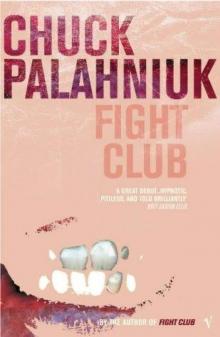 Fight Club
Fight Club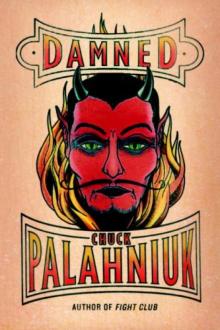 Damned
Damned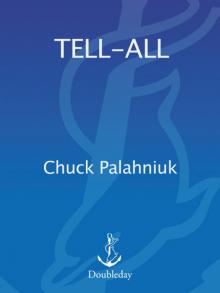 Tell-All
Tell-All Choke
Choke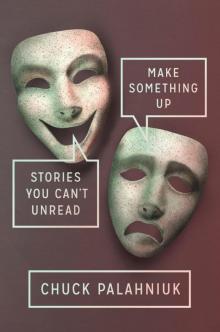 Make Something Up: Stories You Can't Unread
Make Something Up: Stories You Can't Unread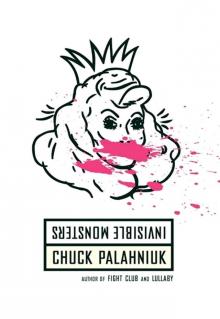 Invisible Monsters
Invisible Monsters Phoenix
Phoenix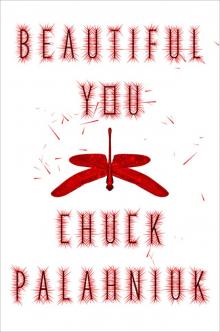 Beautiful You: A Novel
Beautiful You: A Novel Haunted
Haunted Survivor
Survivor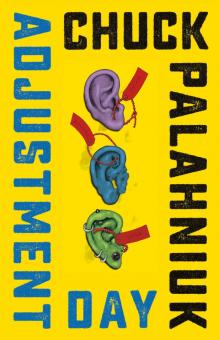 Adjustment Day
Adjustment Day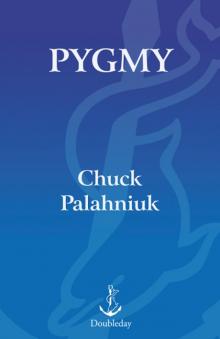 Pygmy
Pygmy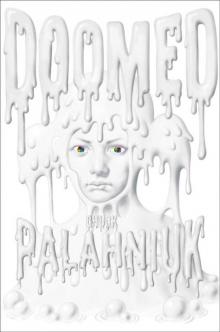 Doomed
Doomed Lullaby
Lullaby Snuff
Snuff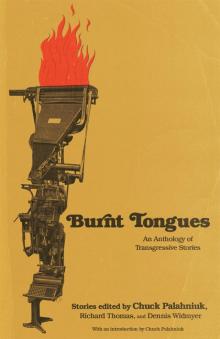 Burnt Tongues
Burnt Tongues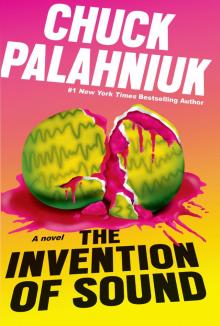 The Invention of Sound
The Invention of Sound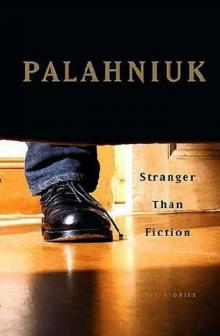 Stranger Than Fiction (True Stories)
Stranger Than Fiction (True Stories)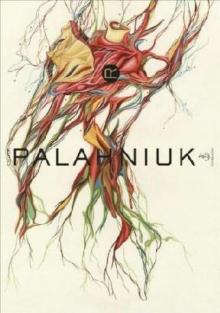 Rant: The Oral History of Buster Casey
Rant: The Oral History of Buster Casey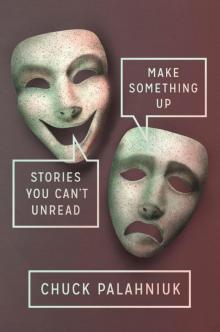 Make Something Up
Make Something Up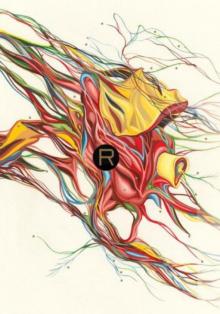 Rant: An Oral Biography of Buster Casey
Rant: An Oral Biography of Buster Casey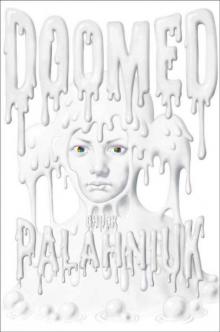 Doomed d-2
Doomed d-2 HOPE AND GORY
HOPE AND GORY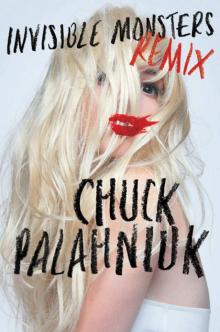 Invisible Monsters Remix
Invisible Monsters Remix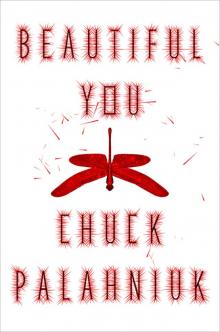 Beautiful You
Beautiful You Fugatives & Refugees
Fugatives & Refugees